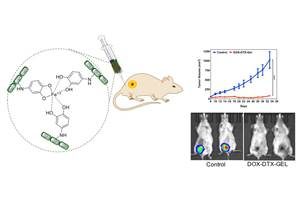 Hydrogel based localized drug delivery has major advantages over the conventional systemic and oral drug delivery in terms of maintaining therapeutic concentration of the drugs at the target site and minimal concentration in rest of the major organs of the body, sparing them of the undesired side effects and toxicity. Doxorubicin (DOX) and Docetaxel (DTX) are potent anticancer drugs used in combination for the treatment of various cancer in clinics. However, their commercial intravenous formulations have major side effects such as cardiotoxicity and hypersensitivity respectively.
Hydrogel based localized drug delivery has major advantages over the conventional systemic and oral drug delivery in terms of maintaining therapeutic concentration of the drugs at the target site and minimal concentration in rest of the major organs of the body, sparing them of the undesired side effects and toxicity. Doxorubicin (DOX) and Docetaxel (DTX) are potent anticancer drugs used in combination for the treatment of various cancer in clinics. However, their commercial intravenous formulations have major side effects such as cardiotoxicity and hypersensitivity respectively.
Dr. Aasheesh Srivastava from Department of Chemistry, IISER, Bhopal; and Dr. Bajaj’s group in collaboration engineered a biocompatible chitosan-catechol based hydrogel (CAT-Gel) assembled through Catechol-Fe(III) coordinative interaction that is capable of entrapping two anticancer drugs and sequentially release them for effective anticancer efficacy with minimal side effects. The authors have synthesized a polymeric hydrogel that is injectable with self-healing nature, biocompatible in nature, and capable of entrapping both hydrophobic (DTX) and hydrophilic (DOX) drugs together. In vivo studies in murine cancer models witnessed a long half-life of the hydrogel till 40 days. Faster release of doxorubicin followed by slow release of docetaxel due to its hydrophobic nature resulted in enhanced anticancer efficacy in murine breast cancer (4T1) and lung cancer (LLC) models. The combination of these two drugs in hydrogel also helped in increasing the median survival of tumor bearing mice. This study shows that coordinately cross-linked polymeric hydrogels present promising biomaterials for localized drug delivery.
For More Details: An Injectable, Self-healing Chimeric Catechol-Fe(III) Hydrogel for Localized Combination Cancer Therapy
ACS Biomater. Sci. Eng.; 2017, (DOI: 10.1021/acsbiomaterials.7b00741)

